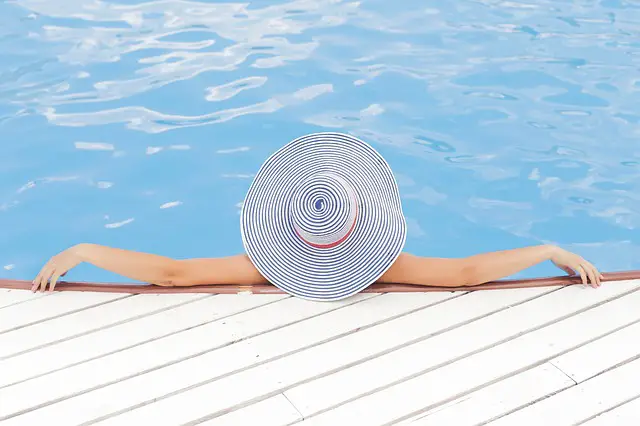Eczema and Chlorine- Should You Swim?
Eczema and Chlorine- Should You Swim?

When you buy through links on our site, we may earn an affiliate commission at no additional cost to you (learn more)
Summertime. Time to relax in the sun and enjoy the hot weather by jumping in a refreshing pool. Then, hours later, you look at your skin and notice an irritation. It’s doesn’t feel or look like sunburn. What could it be and why is it there?
Pools are treated with chemicals to keep them free of bacteria. Such chemicals are very strong and can be harmful to a person’s skin. Pools with much more traffic tend to be treated with an excessive amount of chemicals due to the high volume. This process can lead to skin irritation characterized as eczema.
Eczema is an irritation of the skin. It is identified as itchy, red skin usually seen on the arms or behind the knees. This condition is not exclusive to these sites on the body and can appear anywhere on the skin. It is also more prevalent in children than adults. There are several triggers to eczema and each individual is different. One trigger can be the chemicals in a pool. Pools are treated with the chemical, chlorine. Chlorine causes the skin to dry out resulting in an irritation such as eczema.
What to do After Swimming
There are many ways in which you can go about reducing eczema after swimming in a pool. After exiting a pool, the first thing you should do is shower. Showering allows your skin to greatly reduce the amount of chemicals it has come in contact with. By showering, you are ridding your skin of the leftover water that remains after exiting the pool. When showering, make sure the water is not too hot. Hot water tends to dry out your skin even more than warm or cool water.
It is also important that you moisturize your skin after you rinse off. Applying a moisturizer after your shower will keep the skin moist and prevent it from drying out and causing an irritation, like eczema. You can also apply lotion before entering a pool. This will somewhat block the skin from coming into contact with the chlorinated water. It acts as a barrier between your skin and the water.
If you are having an extreme eczema flare up, it is important that you avoid the pool entirely until your skin is clear. The chlorine in a pool will only allow for the skin to become more irritated. Likewise, if you experience a reaction after taking a dip in a pool, you should consult your doctor for advice on how to handle this.
If you cannot resist taking that refreshing dip in the middle of the summer heat, just remember to take precautions to ensure you don’t have an eczema flare up. Decrease your chances of irritating your skin by showering and moisturizing. If you experience frequent flare ups, consult your doctor to find the best possible treatment for your skin.



